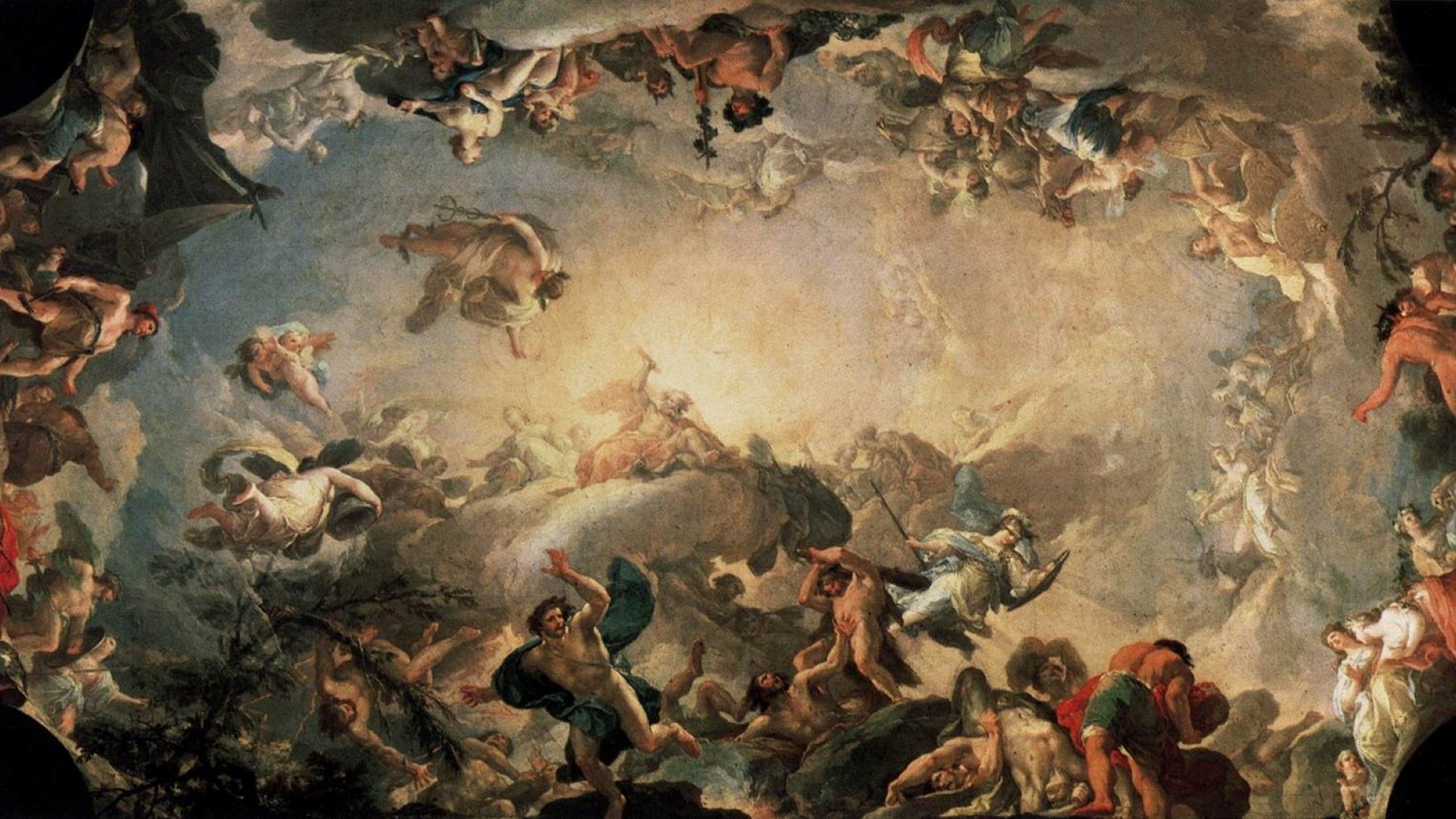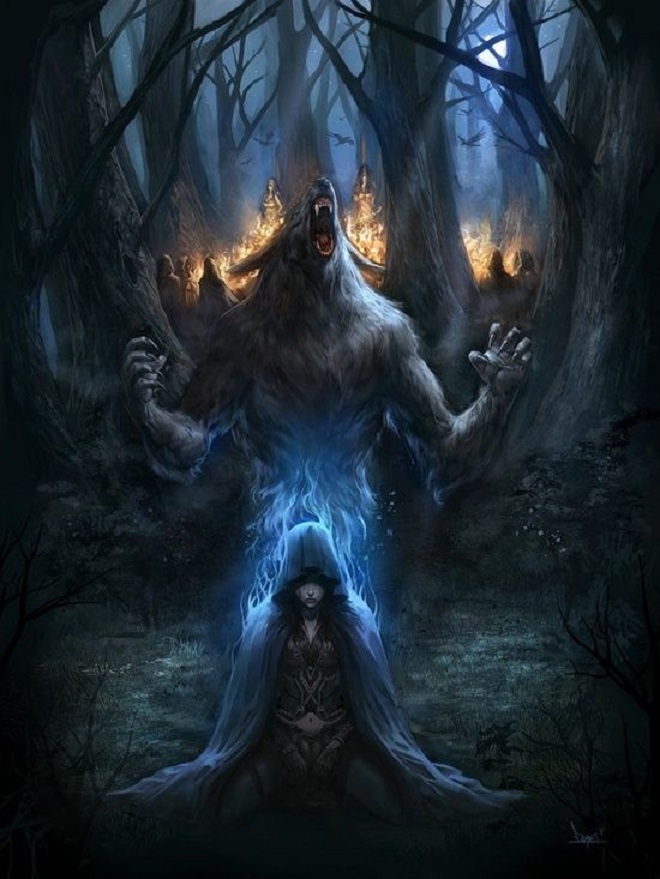
Lycanthrope

The First Lycan
The Myth of the first Lycan:
Few people are aware that even the legend of the werewolf can be tracked back to ancient Greek mythology. Werewolves are also often referred to as lycanthropes. Perhaps because the very first werewolf was a human by the name of Lycaon.
As the story goes, a lot of humans believed that they owed their lives to Prometheus rather than to the gods and goddesses of Mount Olympus. For that reason, many refused to worship them according to Zeus's rules.
A few chose to do more than refuse to worship the gods, however. They went so far as to challenge them out right. The worst of the bunch was a man named Lycaon. He constantly spoke out against the Olympians, cursing their names and uttering blasphemies.
Zeus grew tired of Lycaon's attitude and decided to teach him a lesson. He took mortal form and went into Lycaon's village, sharing his identity with many of the humans that he met along the way. Most humans, once they knew who he really was, began to worship the king of the gods according to his will.
Of course Lycaon wasn't about to do that. Still, he gave the appearance that he was going to listen to what Zeus had to say. He invited him to dinner to discuss what he needed to do in order to gain favor with the gods.
However, Lycaon never intended to keep his end of the bargain. Quite the opposite, in fact, he intended to commit the most grievous act of desecration of which he could conceive.
In his dungeon, Lycaon had many prisoners because he was a wealthy man who could get away with almost any act imaginable. His prisoners were all people that he had decided had dishonored him in some way or who had dared to try and take a morsel of bread from his table.
He took one of his prisoners and slit his throat. He then dismembered the poor soul, to use his body as meat for the stew that he planned to serve for dinner.
Once the meal was prepared and set on the table, Lycaon invited Zeus and his entourage into the dining area. But Zeus immediately smelled the meat and knew what Lycaon had done. Using his thunderbolts, he struck the table, sending the food flying and finally capturing the attention of his so-called host.
Suddenly Lycaon realized he had made a grave error and he began running for his life, with Zeus in hot pursuit. But as he ran, he realized that something was happening to him. His cries became snarls and growls.
His body dropped to all fours and began to alter painfully. His nose became a snout and his ears became pointed. Hair sprung up all over his body and his teetch became sharp and pointed.
Zeus laughed, thinking that he had taught the human a valuable lesson; but the joke was on him. Lycaon discovered that he liked his new condition because it allowed him to continue his bloodthirsty ways. He killed sheep, goats, and humans with reckless abandon until the villagers grew tired of his reign of terror and dispatched him to Tatarus.
Over the years, the concept behind the lycanthrope changed to that of someone who was human during the day and a wolf only at night, when the moon was full. How and why that change came about remains a mystery, although there are a number of theories espoused.
The first lycanthrope, it would seem, may have come to be because of his disrespect of the Greek gods. He wasn't the first to dishonor them and would not be the last. He may, however, have the been the one to pay the heaviest price of all.
[1]
Lycaon, king of Arcadia
Lycaon was a king of Arcadia in Greek mythology, but one punished by Zeus for his impiety. Today, Lycaon is often cited as being the first werewolf.
Lycaon was the son of Pelasgus, one of the first mortals, who was either born of the soil, or was a son of Zeus and Niobe.
Lycaon would succeed Pelasgus as the king of Pelasgia, as Arcadia was then known. This was the period in Greek mythology before the Great Flood when Cecrops was upon the throne of Athens, and Deucalion was king of Thessaly.
King Lycaon was said to have had many wives, including the Naiad nymphs, Cyllene and Nonacris. These many wives would give birth to many sons for King Lycaon, although, whilst it was generally said that Lycaon was father to 50 sons, the names, and even the number, of sons does differ between sources. The sons of Lycaon though, would travel across the region founding many of the towns subsequently located in Arcadia.
Callisto
King Lycaon though also had a famous daughter, Callisto born to the Naiad nymph, Nonacris. Callisto was famously a companion of Artemis, who was then seduced by Zeus, and became pregnant with Arcas; Arcas is therefore a grandson of King Lycaon.
The Downfall of Lycaon
The reasons for the downfall of Lycaon are normally split into two differing tales.
One version of the myth of Lycaon sees the king as a good king and a relatively pious one. King Lycaon established the city of Lycosura, and named Mount Lycaeus after himself.
Lycaon would also instigate the Lycaean Games and constructed a temple dedicated to Zeus. The piety of Lycaon though, manifested itself in one disturbing way, for as part of his worship of Zeus, Lycaon would sacrifice a child upon the altar of Zeus.
The act of human sacrifice would see Zeus turn against Lycaon, hurling down his bolts of lightning, killing Lycaon and his sons.
More commonly though, Lycaon and his sons were seen as being overly proud and impious.
To test Lycaon and his sons, Zeus visited Pelasgia in the disguise of a labourer. As Zeus wandered through the kingdom, signs of the god’s divinity started to show through, and the populace started to worship the stranger.
Lycaon decided to test the divinity of Zeus, and so the king and his sons arranged for a banquet, to which Zeus was invited. A child was killed, and parts of his body were roasted, and parts were boiled, with all parts served up as a meal for the god.
The child butchered for the meal is variously named as Nyctimus, a son of Lycaon, Arcas, the grandson of Lycaon or else an unnamed Molossian child captive.
A furious Zeus overturned the serving table, and the god had his vengeance upon Lycaon and his sons. Now it was said that either Lycaon and his sons were all struck down by lightning bolts, or else it was the sons who were killed, whilst Lycaon fled from the palace and was transformed into a wolf by Zeus, hence the belief that Lycaon was the first werewolf.
It was usually said that one son of Lycaon survived the attack of Zeus, this son being the youngest Nyctimus. With survival either due to the intervention of the goddess Gaia, or else it was Nyctimus who had been the sacrificial son, and as a result he was resurrected by the gods, in much the same way as Pelops would also be resurrected.
In most cases it was Nyctimus who succeeded Lycaon as king, although occasional a generation was missed, and instead Arcas was made king instead.
The successor of Lycaon ruled for but a short time in any case, for it was commonly said that the actions of Lycaon and his sons was the reason why Zeus sent the Deluge upon the earth, to destroy that generation of man.
Versions of the main myth
There are several versions of the Lycaon myth already reported by Hesiod (Fragmenta astronomica, by Eratosthenes, Catasterismi), told by several authors. The most popular version is the one reported by Ovid in the first book of his Metamorphoses.
The different versions of the myth are as follows:
According to the Bibliotheca, Lycaon had sired 50 sons with many wives. These sons were the most nefarious and carefree of all people. To test them Zeus visited them in the form of a peasant. They mixed the entrails of a child into the god's meal, whereupon the enraged Zeus threw the meal over the table, which explains the name of the city Trapezus (from τράπεζα "table"), and killed Lycaon and his sons with lightning. Only the youngest son, Nyctimus, was saved due to the intervention of Gaia.
John Tzetzes records two similar versions which agree with Apollodorus' account; one mentions that the idea to serve Zeus a slaughtered child belonged to Maenalus, one of Lycaon's sons, while the other makes Nyctimus the victim.
According to Pausanias, Lycaon was instantly transformed into a wolf after sacrificing a child on the altar of Zeus and sprinkling the blood on the altar.
According to Lycophron, all were transformed into wolves for having devoured Nyctimus. Lycophron extends the characteristics of Lycaon and his sons onto all the Arcadians.
The version recounted by Hyginus in his Fabulae is basically the same as that of Pseudo-Apollodorus. In Astronomica, Hyginus describes the victim of Lycaon as being Arcas, son of Jupiter (Zeus) and Callisto, the daughter of Lycaon. When saved and restored to life, Arcas was brought up to be a hunter. By mistake, he hunted himself and his mother (for the moment transformed into a bear) into a temple where entrance was punished by death. Both were saved by Zeus to constitute the constellations Arctophylax and Ursa Major, the Great Bear.
Nicolaus Damascenus tells that Lycaon's sons were nefarious. To test Zeus they mixed the flesh of a boy into the sacrifices, whereupon all who were present during the murder of the child were killed by lightning.
According to Ovid, Lycaon mistrusted and derided the signs of Zeus' divine nature which the god openly demonstrated upon arrival to Arcadia. Determined to find out whether the guest was truly a god or a mortal, Lycaon served Zeus the flesh of a prisoner, partly cooked and partly roasted. Moreover, in his quest to test Zeus' immortality Lycaon attempted to murder the god while he slept. Thereupon Zeus brought the roof down and transformed the fleeing Lycaon into a wolf.
According to the dictionary Suda, Lycaon had diligently been guarding the laws established by his father for the Arcadian people. In order to keep his subjects from injustice, he would tell them that Zeus frequented his home in the guise of a mortal man so as to keep watch over how lawful the humans were. One day when he was about to perform a sacrifice, the people were eager to know if the god was present; to find out if Lycaon told them the truth about Zeus' visits, they killed one of the king's fifty sons and mixed him in with the sacrificial meat, whereupon all of them were killed by lightning.
According to Eratosthenes, Lycaon butchered his grandson (that is, Arcas), who was put together again by Zeus and placed upon the constellations, whereas Lycaon's house was struck by a thunderbolt.
Lycaon in Greek Mythology
In Greek mythology Lycaon may refer to:
Lycaon (son of Priam), son of king Priam of Troy by Laothoe
Lycaon of Arcadia, son of Pelasgus and Meliboea, the mythical first king of Arcadia
Lycaon, brother or son of Eurypylus of Cyrene

Sources
Pausanias, Description of Greece, 8. 2. 1
Hyginus, Fabulae 225
Pseudo-Apollodorus, Bibliotheca 3.8.1
Tzetzes on Lycophron 481
Dionysius of Halicarnassus, Antiquitates Romanae 1.11.2 & 1.13.1
Greek Papyri III No. 140b
Dionysius of Halicarnassus, Antiquitates Romanae 1.13.1
Scholia ad Euripides, Orestes 1642
Pausanias, Graeciae Descriptio 8.17.6
Tzetzes on Lycophron 480
Scholia on Apollonius Rhodius, Argonautica, 1.1213
Etymologicum Magnum, 288. 33 (under Dryops)
Stephanus of Byzantium, Ethnica s.v. Psōphis
PSeudo-Apollodorus, Bibliotheca 3.8.1
Pausanias, Graeciae Descriptio 8.3.1–5
Tzetzes on Lycophron, 481
Plutarch, Quaestiones Graecae, 39
The dictionary of classical mythology, Pierre Grimal, p. 346-7
Hertz, Wilhelm (1862). Der Werwolf. Beitrag zur Sagengeschichte (in German). von A. Kröner, Stuttgart.
Pseudo-Apollodorus, Bibliotheca 3. 8. 1 - 2
Tzetzes on Lycophron, 481
Pausanias, Description of Greece, 8. 2. 3
Lycophron, Alexandra, 480
Hyginus, Fabulae, 176
Theoi: Astronomica, Bear-watcher, by Gaius Julius Hyginus (translated by Mary Grant).
Ovid, Metamorphoses, 1. 216 - 239
Suda s. v. Lykaōn
Pseudo-Eratosthenes, Catasterismi, 8
[1] "Atlanta Vampire Alliance "
"Wikipedia"
Our Mobile Application
Check out Our Mobile Application "Ancient Greece Reloaded"


